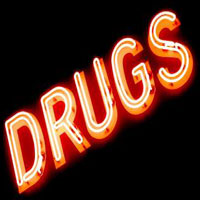- About Us
- Columns
- Letters
- Cartoons
- The Udder Limits
- Archives
- Ezy Reading Archive
- 2024 Cud Archives
- 2023 Cud Archives
- 2022 Cud Archives
- 2021 Cud Archives
- 2020 Cud Archives
- 2015-2019
- 2010-2014
- 2004-2009
 |
Smashed Pepper |
The media are upping the ante in The War Against Drugs in Australia, with the hardly astounding revelations published this week in the Sunday Telegraph (June 11th) that traces of illicit substances have been found in toilet cubicles all across the city in restaurants, nightclubs, football stadiums and even the hallowed washrooms of State Parliament. According to countless other reports in recent times there are massive problems in airport security allowing for the free passage of millions of dollars worth of narcotics both intra and internationally. As such problems are elevated in the public consciousness it is reasonable to assume that the Government will implement knee'jerk policies to ensure that the public believes that illegal drugs are harder to get hold of on the streets and drug related crime is falling. Improving airport security at the expense of the traveller seems very likely. So does a predictable Police blitz on drug users and lower-level dealers, accompanied by some deftly placed front'page reports of a "Record Seizures" worth however many hundreds of millions of dollars "on the streets".
 Call me a cynic, but I doubt anybody will be waxing lyrical on the topic "Australia: A Drug Free Utopia" at any time soon. Drug traffickers trade on the maxim of building better mousetraps, and I doubt whether improved security with baggage handling will do much to stem the tide of inflowing drugs. The volumes of narcotics flowing through airports will shift from personal baggage to shipping, or air-freight, or whatever other means that can be employed; and even if the volume of drugs is decreased, the laws of supply and demand will only increase the price, raise the costs of addiction, and result in more drug fuelled crime. Limiting the importation of drugs might also push drug syndicates into funding and producing different classes of narcotics domestically to avoid the scrutiny of the Federal authorities at our international ports.
Call me a cynic, but I doubt anybody will be waxing lyrical on the topic "Australia: A Drug Free Utopia" at any time soon. Drug traffickers trade on the maxim of building better mousetraps, and I doubt whether improved security with baggage handling will do much to stem the tide of inflowing drugs. The volumes of narcotics flowing through airports will shift from personal baggage to shipping, or air-freight, or whatever other means that can be employed; and even if the volume of drugs is decreased, the laws of supply and demand will only increase the price, raise the costs of addiction, and result in more drug fuelled crime. Limiting the importation of drugs might also push drug syndicates into funding and producing different classes of narcotics domestically to avoid the scrutiny of the Federal authorities at our international ports.
A controversial solution to The Drug Problem was proffered by Gore Vidal in the New York Times on September 26th ,1970, and is worth reconsideration today. His thesis was that the government should sell illegal drugs at cost and in doing so eliminate the role of organised crime in the drug trade. He surmised that there will always be a minority of lost souls who fall victim to the luring effects of narcotics, but when given the chance most of us will not become users just because drugs are readily available.
 Vidal also cited the psychological phenomena that making something illegal and hard to obtain only serves to increase its appeal. Being a recreational drug user is a badge of both financial status and disregard for the law, which are desirable traits that are regularly re-enforced and rarely discouraged in popular culture.
Vidal also cited the psychological phenomena that making something illegal and hard to obtain only serves to increase its appeal. Being a recreational drug user is a badge of both financial status and disregard for the law, which are desirable traits that are regularly re-enforced and rarely discouraged in popular culture.
I am certain that a plan like Vidal's would never be sanctioned by this electorate if it were ever brought to debate. The fear of opening the door to reckless drug use and abuse would see to that. However it would be prudent for our policy makers to investigate different methods of curtailing the drug problems we seem to have, as it is clear that most of the tactics the authorities have used historically have done little to stop wide-spread supply and use of drugs. After all the city is awash with drug abuse if you believe everything you read.
The constant in the equation is that there is too much financial incentive for criminals who import and distribute illegal drugs, and those at the source of the schemes have too many people below them actually handling the drugs that it is rare that they themselves are caught. On the other hand it seems common for their peons to be trapped in situations with little room to mitigate their culpability. It hardly seems fair that those with low level involvement in drug trafficking operations are the same people who are considered responsible and wear the punishment for falling victim to greed and financial manipulation. And even if crime syndicates are decapitated, there is only more incentive for new syndicates to fill the vacuum and start the cycle all over again.
 To target those responsible for the illegal drug trade the Government must investigate alternative methods of running them out of business. Take away the financial incentive and there would be very little reason for anybody to trade in drugs. A system of legal and regulated distribution of drugs with access to appropriate counselling services, educational, and medical support for drug users is a practical strategy that should not be dismissed.
To target those responsible for the illegal drug trade the Government must investigate alternative methods of running them out of business. Take away the financial incentive and there would be very little reason for anybody to trade in drugs. A system of legal and regulated distribution of drugs with access to appropriate counselling services, educational, and medical support for drug users is a practical strategy that should not be dismissed.
